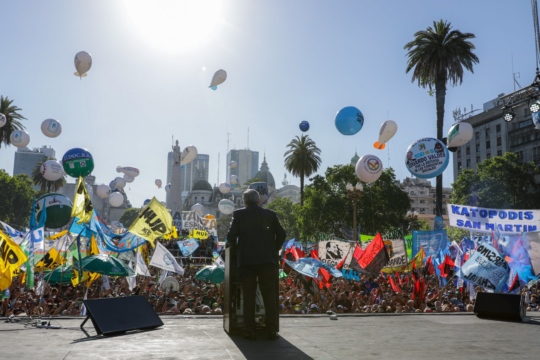
Will Argentina’s Governors Stymie Milei’s Agenda?
A Latin America Advisor Q&A featuring experts’ views on provincial governments in Argentina.
Bruno Binetti is a non-resident research fellow with the office of the president at the Inter-American Dialogue. He was previously a research assistant at the Woodrow Wilson Center for International Scholars and has also worked as a legislative aide in the Argentine Congress. Binetti holds a BA in international studies from Torcuato Di Tella University and an MA in international affairs and development from George Washington University’s Elliott School of International Affairs, where he was a Fulbright Scholar. He writes on Latin American political and economic trends and China- Latin America relations and has taught courses at Torcuato Di Tella University and the Catholic University of Argentina.
A Latin America Advisor Q&A featuring experts’ views on provincial governments in Argentina.
A Latin America Advisor Q&A featuring experts’ views on Milei’s suspension of labor reforms in Argentina.
A Latin America Advisor Q&A featuring experts’ views on the presidential elections in Argentina.
On the night of November 14, Argentine President Alberto Fernández euphorically celebrated an electoral defeat. Earlier that day, in the legislative elections, the ruling Peronist coalition –Frente de Todos– obtained only 33.5 percent of the national vote against 42 percent of the opposition coalition Juntos por el Cambio. Why was the president celebrating, then, apart from lifting the spirits of Peronist supporters?
Argentina’s ruling Peronist coalition -Frente de Todos- came close to collapsing after suffering a humiliating defeat in the September 12 primary elections, when it obtained only 32 percent of the vote nationally, against 42 percent for the opposition coalition, Juntos por el Cambio.
Mauricio Macri’s failure confirms that there seems to be no politically sustainable way to open up and reform Argentina’s economy. The long-term benefits of liberalizing, improving competitiveness and reducing fiscal spending might be clear in theory, but the immediate social costs of these policies are simply too high for Argentines to bear.
To his credit, [President] Fernandez allowed [Minister of Economy] Guzman to put forward cuts to populist public utility subsidies, streamline the pension system and cool the money presses that feed Argentina’s 40% inflation rate. But [Vice President] Fernandez de Kirchner scotched those market-soothing measures, essentially relegating Fernandez and Guzman as her Men Friday.
No hay que exagerar la importancia del cambio de gobierno en EEUU para las negociaciones de Argentina con el FMI. Nadie en EEUU quiere un default argentino, sobre todo cuando hay preocupación por el nivel de deuda de otros países emergentes, pero el Tesoro no va a presionar al Fondo para que acepte un acuerdo a cualquier precio.




